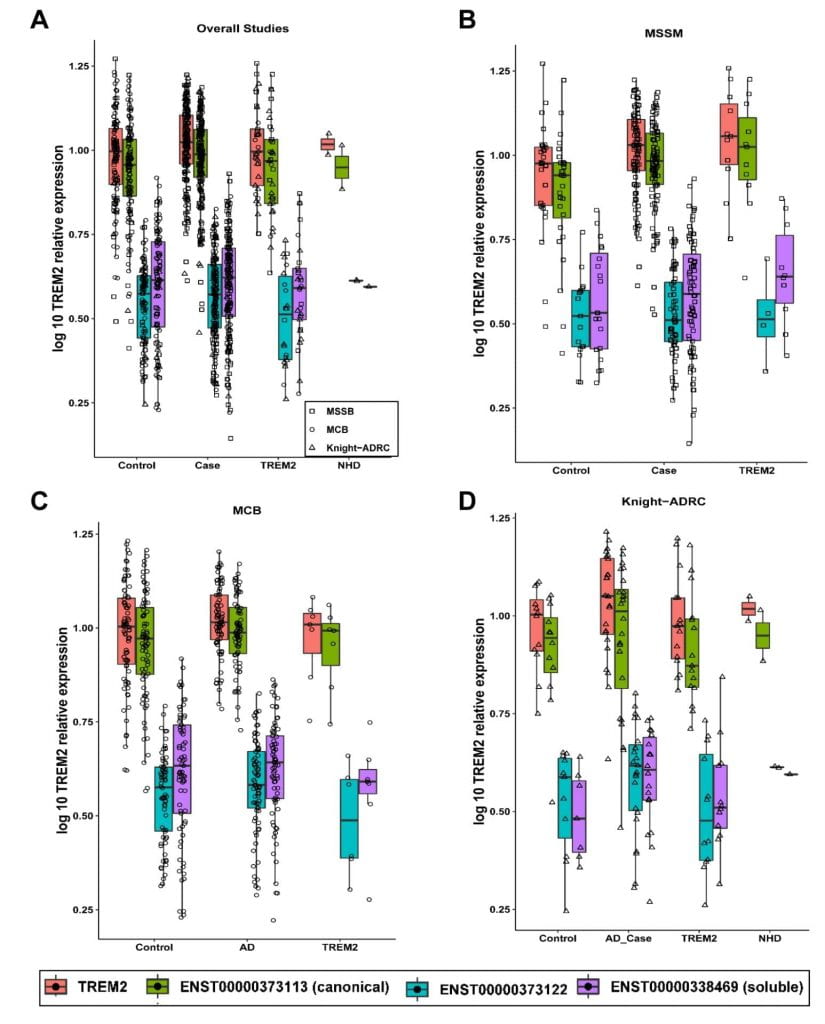Identification of pathogenic mutations in the amyloid precursor protein (APP), presenilin 1 and 2 (PSEN) genes has been key to understanding some of the fundamental pathogenic events of Alzheimer’s disease (AD). Recent studies from our lab and others have identified novel associations between AD and Triggering receptor expressed on myeloid cells 2 (TREM2), sortilin related receptor 1 (SORL1), ATP binding cassette subfamily A member 7 (ABCA7) and PLD3 (phospholipase D3). However, the pathogenic events triggered by the genetic variants in those genes are not yet fully characterized. To identify the central networks leading to AD and to understand the role of APP, PSEN1, PSEN2, Apolipoprotein E (APOE), TREM2, ABCA7, SORL1 and PLD3 in AD pathogenesis, we propose to generate bulk and single-nuclei RNA-seq data from Mendelian mutation and risk variant carriers, age-gender matched cases (non-carriers, sporadic AD) and elderly non-demented individuals, and perform systemic and cell-type specific co-expression network analyses. The goal of these analyses is to identify networks and modules that are overrepresented in carriers from a specific gene (i.e; PSEN1). By comparing the networks identified in carriers for each gene, we will determine whether those genes are leading to AD by different mechanisms. Then we will test whether the previously identified networks and modules identified in the variant carriers also contribute to sporadic (non-carrier) AD cases, and determine in which stage of the disease those networks lead to disease. We will use cell-based models (iPSC-derived neurons, astrocytes, oligodendrocytes and microglia) to validate the networks. The results from this project will have great implications for the current preventative drug trials, many of which are focused on Mendelian forms under the assumption that there are global pathways which are similar in early and late onset AD; and will provide an enhanced understanding of the fundamental molecular mechanisms underlying AD, as well as the identification of novel potential therapeutic targets and compounds.

Publications
- Jiang S, Wen N, Li Z, Dube U, Del Aguila J, Budde J, Martinez R, Hsu S, Fernandez MV, Cairns NJ; Dominantly Inherited Alzheimer Network (DIAN); International FTD-Genomics Consortium (IFGC), Harari O, Cruchaga C, Karch CM. Integrative system biology analyses of CRISPR-edited iPSC-derived neurons and human brains reveal deficiencies of presynaptic signaling in FTLD and PSP. Transl Psychiatry. 2018; 8(1):265.
- Li Z, Del-Aguila JL, Dube U, Budde J, Martinez R, Black K, Xiao Q, Cairns NJ; Dominantly Inherited Alzheimer Network (DIAN), Dougherty JD, Lee JM, Morris JC, Bateman RJ, Karch CM, Cruchaga C, Harari O. Genetic variants associated with Alzheimer’s disease confer different cerebral cortex cell-type population structure. Genome Med. 2018; 10(1):43. PMCID: PMC5992755
- Karch CM, Jeng AT, Nowotny P, Cady J, Cruchaga C, Goate AM. Expression of novel Alzheimer’s disease risk genes in control and Alzheimer’s disease brains. PLoS One 2012; 7(11):e50976. PMCID: PMC3511432